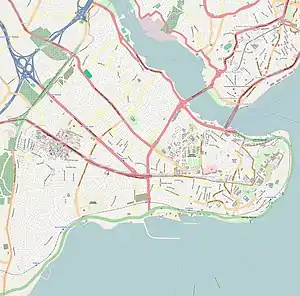Cistern of Philoxenos
The Cistern of Philoxenos (Greek: Κινστέρνα Φιλοξένου), or Binbirdirek Cistern, is a man-made subterranean reservoir in Istanbul, situated between the Forum of Constantine and the Hippodrome of Constantinople in the Sultanahmet district. It has been restored and is now visited as a tourist attraction. The entrance is located at İmran Öktem Sokak 4. Binbirdirek Cistern is the second largest cistern in Istanbul after the Basilica Cistern.[1]
 Interior of the cistern | |
 Shown within Istanbul Fatih | |
| Location | Istanbul |
|---|---|
| Coordinates | 41°0′27″N 28°58′28″E |
Construction
The reservoir has a surface area of 3640 m2, storing 40,000 m3 of water.[2] The cistern is composed of a large hypostyle chamber supported by vaults.[2] The 224 columns, each 14 to 15 meters tall, are made of marble from nearby Marmara Island. Each column is a superposition of two columns, joined by a marble ring. The floor of the cistern was later reinforced, so that only the upper column and a short sleeve of the lower column are thus visible. The original height can be seen in an excavated pond with four columns in the middle of the cistern. Most of the columns, and also the caps, are engraved with a Greek mason's mark.[2]
Restoration
The cistern was restored by Justinian I in the 6th century, after the palace was completely destroyed in a fire in 475. After the conquest of the city by the Ottomans in 1453, the cistern fell into disuse, and was forgotten until rediscovered during the construction of Fazli Pasha's palace on the same site in the 17th century.[2]
1001 columns
The name Binbirdirek translates from Turkish as "1001 Columns" although the true number is only 224. The difference is due to the Turkish expression, "binbir" (i.e. 1001), being a turn of phrase that is often used to express something that is numerous and varied. An example of this is the expression "binbir zahmetle", which literally translates to "with a thousand and one toils", meaning "with many difficulties". As such, the cistern's name is intended to be evocative rather than descriptive.
Gallery
 Cistern of Philoxenos general view
Cistern of Philoxenos general view An excavated pool showing the original height of the double columns. The cistern was constructed under a palace, often identified as the Palace of Antiochos in the 5th century.[2]
An excavated pool showing the original height of the double columns. The cistern was constructed under a palace, often identified as the Palace of Antiochos in the 5th century.[2] Cistern of Philoxenos ceiling
Cistern of Philoxenos ceiling Cistern of Philoxenos Capital with mason's mark
Cistern of Philoxenos Capital with mason's mark Cistern of Philoxenos Column with mason's mark
Cistern of Philoxenos Column with mason's mark
See also
| Wikimedia Commons has media related to Cistern of Philoxenos. |
References
- Binbirdirek Cistern Istanbul
- Müller-Wiener (1977), p. 280-81
Sources
- Alexander Kazhdan (éd.), The Oxford Dictionary of Byzantium, 3 vols., Oxford University Press, 1991 (ISBN 0-19-504652-8), s. v. Constantinople, Monuments of : Cisterns, vol. 1, 518-519 ;
- Müller-Wiener, Wolfgang (1977). Bildlexikon zur Topographie Istanbuls: Byzantion, Konstantinupolis, Istanbul bis zum Beginn d. 17 Jh (in German). Tübingen: Wasmuth. ISBN 978-3-8030-1022-3.